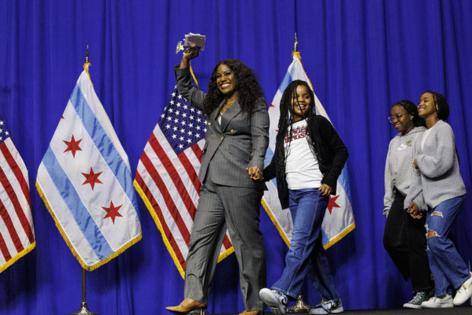Commentary: Embracing school choice will move Democrats back to the center
Published in Op Eds
Education reform has long been a contentious issue in American politics, and the debate over school choice is especially divisive. Ironically, President-elect Donald Trump’s support of efforts to provide families with educational options presents Democrats with a critical first opportunity to embrace bipartisanship and pivot toward the political center.
However, if Illinois is the bellwether, Democrats risk further alienating moderate and minority voters who value educational choice.
At its core, school choice empowers parents to decide which educational environment best suits their children, irrespective of their ZIP code or socioeconomic status. Initiatives such as the Educational Choice for Children Act supported by Trump and the GOP use tax credits to incentivize private donors to fund scholarships. These scholarships enable families to afford private schools when their local public schools fail to meet their needs.
Proponents say that school choice gives families the freedom to pursue better educational opportunities, particularly in underserved communities. Of course, detractors argue that these programs siphon resources away from public schools, potentially exacerbating existing inequities.
Despite the criticisms from the usual special interests — i.e., teachers unions — school choice enjoys strong public support. A 2022 RealClear Opinion Research poll found that 72% of voters, including 68% of Democrats, favor such initiatives. This level of bipartisan approval indicates a growing recognition of the importance of educational flexibility, especially for families in struggling school districts.
Unfortunately, Illinois provides a cautionary tale of what happens when political allegiance to teachers unions takes precedence over families. In 2017, Illinois established its Invest in Kids program, a statewide initiative designed to help low-income families access private education much like the federal proposal. For six years, this program provided scholarships to thousands of children, many of them Black and brown who would otherwise have been trapped in underperforming public schools.
In 2023, however, a more progressive Democratic-controlled legislature opted not to extend the program, making Illinois the first state in the nation to eliminate a school choice initiative. The decision had immediate consequences: Thousands of children lost their scholarships, and several private schools announced closures due to reduced enrollment and financial hardship. Teachers unions claimed victory.
This move highlights the tension within the Democratic Party. The decision to kill the Invest in Kids program in Illinois not only ignored public sentiment but also harmed the very communities Democrats claim to champion.
In Democratic strongholds on the South and West sides of Chicago, many Black pastors have expressed interest in opening their own private schools as part of their church offering, but affordability remains an issue. In Latino communities, Catholic schools struggle to stay open in spite of the support from families. A tax credit scholarship would go a long way in supporting these key institutions in minority communities.
Yet many progressive Black and Latino lawmakers, led by their white counterparts, freeze at the thought of crossing their benefactor — the Chicago Teachers Union. Too often, their political self-preservation takes precedence over their community’s self-interest.
It is worth noting that 30% of public school teachers in the Chicago metropolitan area, including CTU President Stacy Davis Gates, choose to send their children to private schools rather than to their assigned public school. Why? Because it is their right, and quite frankly, because they can afford it. Unfortunately, poor families don’t have that privilege.
The Illinois dichotomy underscores the dangers of reflexive opposition to school choice. Rather than doubling down on partisanship, Democrats in Congress have an opportunity to engage constructively on this issue. Such an approach would not only improve outcomes for students but also signal to voters that Democrats are responsive to community needs, not to powerful teachers union interests, and are willing to rise above partisan politics.
The 2024 elections sent a clear message: Voters are tired of ideological extremes and want practical solutions to everyday challenges. School choice offers Democrats a chance to align with public sentiment and demonstrate a commitment to pragmatism over partisanship.
Democrats face a choice: Cling to outdated alliances with teachers unions such as the CTU or embrace a more centrist, solutions-oriented approach to education reform. To be clear, supporting school choice does not mean abandoning public education. Rather, it means recognizing that the current system does not work for everyone.
By working across the aisle to develop thoughtful, balanced school choice policies for kids and families, Democrats can signal their first move toward a more centrist party that values working-class families over political expediency.
____
Juan Rangel is CEO of The Urban Center, a Chicago-based nonprofit focused on giving voice to a centrist community. Rangel is a longtime school reform and school choice advocate and a Democrat.
_____
©2025 Chicago Tribune. Visit at chicagotribune.com. Distributed by Tribune Content Agency, LLC.




























































Comments